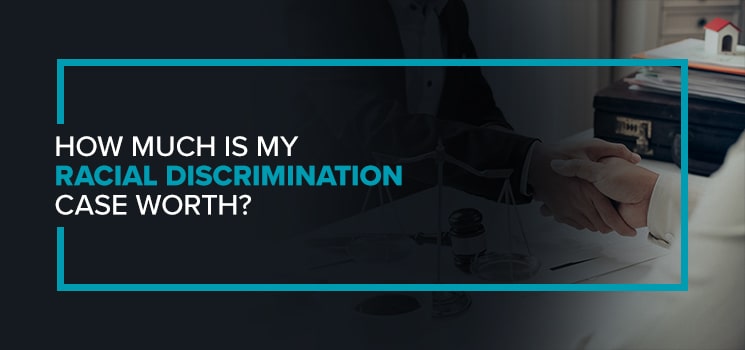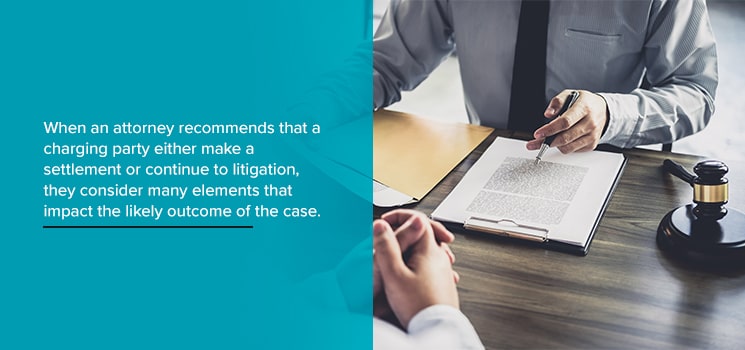Workplace racial discrimination is a serious problem, but there are several laws that guarantee employees’ rights. A victim of racial discrimination can resolve charges through a settlement or lawsuit. These remedies act as a “make whole” relief designed to restore the victim to the same position — or a similar one — as they would have been without the discrimination.
If you believe you have a workplace racial discrimination case, you may still wonder what following through with litigation could cost. It can be helpful to understand the possible outcomes of a racial discrimination case so that you and your attorney can decide on the course of action that most benefits you.
Settlements For Racial Discriminator Cases
Not all workplace racial discrimination charges make it to litigation. Many are resolved outside of court through a voluntary agreement called a settlement. In a settlement, the employer pays benefits to the charging party without going through with legal proceedings.
Settlements occur frequently. According to data from the U.S. Equal Employment Opportunity Commission (EEOC), of the over 22,000 charges filed in 2020 alleging race-based discrimination in the workplace, 6.8% were resolved through negotiated settlements. Another 5.1% were withdrawals with benefits, in which the charging party and employer reached an agreement separate from the EEOC that awarded benefits to the charging party. The exact average amount for racial discrimination settlements is difficult to determine since most settlements are resolved privately.
Racial discrimination lawsuit settlement amounts depend on many factors. The type of case, your location and the strength of your proof all play a role in determining what benefits you receive. Consulting with an experienced attorney who understands how to evaluate the elements of your case can help you gather a reasonable estimate of your settlement.
Damages In Racial Discrimination Cases
If a charging party takes their case through to litigation and wins, they could be awarded damages for their expenses and other losses because of the discrimination. A court will award relief depending on the type of discriminatory action and its effect on the victim. For example, in a wrongful termination case, the employer may be required to offer the same or a similar position to the charging party, along with equal pay and benefits.
Damages for a racial discrimination case are either compensatory or punitive. Compensatory damages include economic and non-economic damages the charging party suffers, including the out-of-pocket costs of pursuing litigation or searching for a new job as well as lost wages and emotional harm the discrimination caused. On the other hand, punitive damages are intended to punish the employer for malicious or reckless discriminatory acts.
1. Economic Damages
The first part of compensatory damages, economic damages, repay the charging party for incurred financial losses. These include lost wages and benefits as a result of the discriminatory action. The purpose of awarding economic damages is to restore the complainant’s income they would have received if not for the discrimination.
Economic damages can include back and front pay. Back pay is compensation to make up the difference between what the employer paid the employee and what they should have paid. Back pay can apply to situations such as failure to hire, removal, suspension and denial of promotion.
Front pay is an element of the “make whole” relief for victims of employment discrimination. This kind of compensation applies to situations where a complainant is offered reinstatement in their position but declines the offer. This could also occur if there is no similar position available or the working relationship between the employer and complainant would be hostile.
2. Non-Economic Damages
Non-economic damages compensate you for the emotional harm you suffered from workplace racial discrimination. Emotional harm might include inconvenience, mental anguish, loss of reputation or loss of enjoyment of life.
Non-economic damages often cannot be precisely quantified. However, non-economic damages must be rigorously proven. It is not sufficient to say that you were upset or insulted.
It is helpful to keep detailed records or provide compelling testimony from family, coworkers or healthcare professionals who witnessed the discrimination’s emotional effect on you. These witnesses can attest to the physical and emotional consequences you suffered, like sleeplessness, loss of self-esteem, anxiety or depression. If applicable, you could also seek counseling or therapy for the emotional distress caused by the discrimination.
The charges you accumulate for emotional harm can give a court a clear understanding of what workplace discrimination has cost you.
3. Punitive Damages
The other major category of relief for employment discrimination is punitive damages. These damages are not a result of the harm you suffered but are instead meant to punish the harmful misconduct of your employer.
Punitive damages only apply to the defendant if they acted in knowing disregard for the employee’s rights. Courts award punitive damages in about 5% of verdicts. Courts will also consider the ratio of punitive damages to compensatory damages and may reduce punitive damages if they are far greater.
4. Attorney’s Fees and Costs
You may also be awarded attorney’s fees and costs if you win your lawsuit, either in whole or part. Being awarded attorney’s costs help compensate you and your legal team. If you file a charge that alleges violations of Title VII of the Civil Rights Act of 1964, you are typically entitled to an award of attorney’s costs if you prevail in your case.
A court calculates attorney’s fees based on the amount of time and money your attorney spent working on your case. You may also be eligible for an award of attorney’s fees if you resolve the case through a negotiated settlement out of court. In addition, a prevailing complainant is also entitled to the recovery of costs like transcription costs and witness fees.
What Is My Racial Discrimination Case Worth?
When an attorney recommends that a charging party either make a settlement or continue to litigation, they consider many elements that impact the likely outcome of the case. To determine whether to advise you to accept or reject a settlement offer, lawyers will look at these factors:
- Your evidence’s strength and the risk of losing litigation.
- How grievous your employer’s discrimination was, and how likely it is to anger a jury.
- Whether your employer has a history of racial discrimination.
- The extent of damages you suffered.
- Whether your employer has insurance to cover your claims.
- Your willingness to wait through the time-consuming process of pursuing litigation.
It takes time and effort to determine whether a settlement is worth it or whether you should pursue litigation. An experienced lawyer will analyze all of these factors and recommend the course of action they think will benefit you the most.
To determine if you should sue your employer over racial discrimination, consider the potential costs and what outcome you are hoping for. Litigation is one of the best systems in American law for creating accountability for unjust actions. If your employer discriminated against you, pursuing a lawsuit can help keep the same kind of incident from occurring again. A racial discrimination lawsuit can also help you recover from lost wages and emotional damage suffered because of discriminatory action.
Contact the Racial Discrimination Attorneys at Weisberg Cummings
Many factors go into the decision to pursue litigation for racial discrimination. If you believe you may have a case and want to develop it further so you can recover your losses, the attorneys at Weisberg Cummings are here to help. We can determine which evidence is most relevant to your case. Our experienced attorneys can argue for you in court or help you reach a beneficial settlement with your employer. Contact us today and get your free consultation with one of our trusted lawyers.



